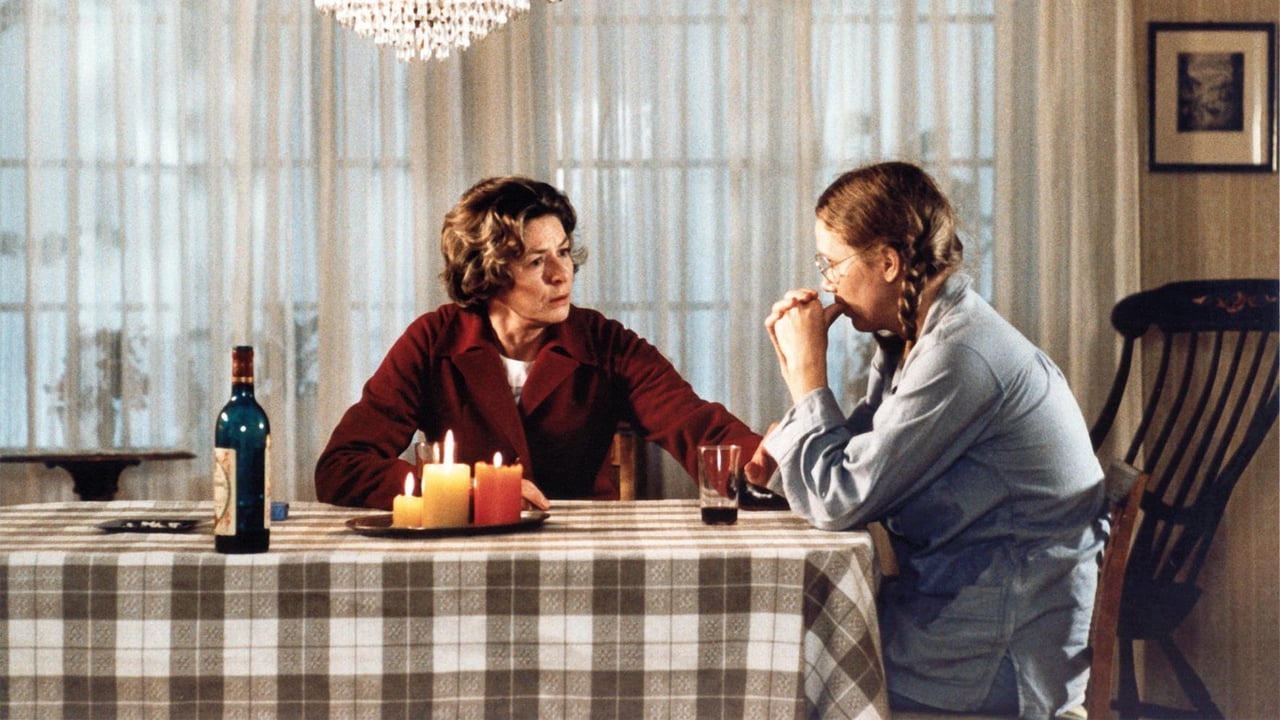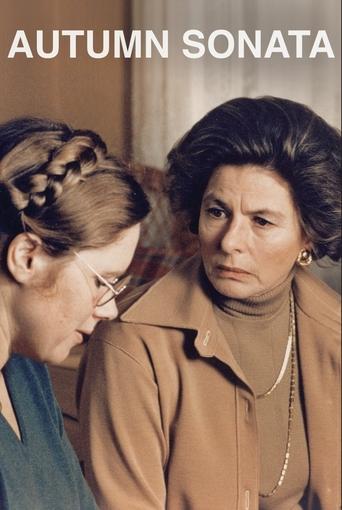

Plot so thin, it passes unnoticed.
... View MoreGood story, Not enough for a whole film
... View MoreIt's entirely possible that sending the audience out feeling lousy was intentional
... View MoreIt's a movie as timely as it is provocative and amazingly, for much of its running time, it is weirdly funny.
... View MoreVisually, it lacks the aesthetics of Bergman's black and white movies. Theatrically, it's melodramatic. Both Ingrid and Liv overact their parts (Liv's ridiculous, oversized eyeglasses are a distraction.) Ullmann's climactic monologue of woes is the most powerful part of the movie but too long. In general, it lacks subtlety and the ending is a weak attempt at transformation which lacked credibility for me. Maybe in its day it was groundbreaking psychologically but I think better acting and editing was needed for greatness. The subplot with the disabled sister and especially the cryptic flashback to her youth seem unneeded to me, just a thickening rather than a new flavor. The scene where daughter and then mother play the same piano work by Chopin is quite original and well done. It merits seeing as a work by Bergman with Bergman as lead for your fund of film experience.
... View More"Autumn Sonata" (1978), was the last film made by Ingmar Bergman for the cinema, which happened after this were videos for the TV. However, in the last film is not sketched any nostalgia, on the contrary, it is a reunion there are several characteristics that marked the famous Swedish director.Such as his strong relationship with the theater, with the actors, the use of symbols and metaphors, the simplicity of his locations (which he turns into a great advantage), the psychological character in formation and human relations, striking and challenging women , The expressiveness of a face in its close's and big close's and how much it speaks or even shouts moments of silence, moments when not verbalizing suggests so many things. As in the scene where Eva (Liv Ullman) plays a few notes on the piano for her mother, Charlotte (Ingrid Bergman), a magisterial and anthological moment, in the force and expressiveness of two actresses who say nothing on the scene but suggest a universe Of rivalries, misunderstandings and anguish in a (non) relation of mother and daughter.Autumn Sonata "is a tragic burden of human emotion, and is mostly a drama of confessions between two women, who dialogue with each other, which ends up generating a certain monotonous production noise, especially by the subtle clash of the Seem to dominate much of the film, which may have been elaborated in an attempt to generate a frenzy in the audience for the climax, which is not necessary or even does not work, because in the invitation letter written by Eva and In the opening monologue performed by Eva's husband, it is already clear that there, it will be a place to settle accounts.In addition to its musical allusion, the film's title keeps track of another central point: the idea of seasons and cycles. It is clear the reference of this change of seasons in the photograph of Sven Nykvist who collaborates with his pale and washed palette and without great dependences of the artificial light, lamps and candles, call attention to the cold of the winter. However, in what seems to be a contradiction, many of Nykvist's scenes are garlands with flowers. They appear in dozens of scenes. Normally associated with spring, the presence of flowers is a clear reminder of the cyclical nature of life and our relationships with others. The cold will pass, suggest the flowers, we only have to endure this during the winter.Filled with distressing emotion and agonizing eyesight, "Autumn Sonata" offers a methodically potent examination of the pain we choose to keep inside, and the scars that remain with us as a result. Like most Bergman films, the image is replete with existential questions and gloomy reflections, deeply investigating the mysteries of the challenges inherent in life, and depending on the interpretation, the ending may offer some level of optimism and catharsis, the film's elegiac mood And almost impossible confessions of hating and indifference remain irrevocably haunting.Another feature that Bergman has always been able to use, was his complete understanding that in the end, a film ends up always being the actors, they are the face and the memory of the film and they have the capacity to generate reciprocities with the public. So, Bergman is undoubtedly the director, but in the end, are Liv Ullman, Ingrid Bergman and Lena Nyman who play the Sonata.
... View MoreAutumn Sonata is a gem of a film from renowned Swedish director Ingmar Bergman which centers around the complicated and difficult relationship of a famous pianist, Charlotte and her eldest daughter, Eva, portrayed by stalwarts Ingrid Bergman and Liv Ullmann respectively.Autumn Sonata begins with the pianist mother Charlotte visiting Eva and her husband. Initially, the mother-daughter relationship does seem a bit frigid though courteous. Gradually, as the film unfolds, several dimensions to this relation gets revealed -Charlotte's career, Eva's childhood, the presence of a second daughter among others.Autumn Sonata's most enduring memory is its crescendo involving the two brilliant actors Ingrid Bergman and Liv Ullmann. While it would amount to being a spoiler attempting to describe what happens, it can suffice to say that Ingmar Bergman's greatness bursts through in this climax and one discovers the tremendous potential of a chamber drama.This is no doubt what great cinema is about and while one of the two central figures certainly blows the viewer away with her intensity, the tremendous impact and presence of the other can only be felt on multiple viewing, and this chemistry is what contributes to Autumn Sonata being perhaps one of the best films ever made, most certainly by Ingmar Bergman and maybe even in the history of cinema.
... View MoreI catch a Bergman movie anytime I can, I've loved all I've seen so far (Jungfrukällan, Nattvardsgästerna, Vargtimmen, Det Sjunde Inseglet). This - even tho good - was maybe the least favorite so far.I had zero knowledge of this movie before seeing it, a perfect way to see a movie, I only knew it was a Bergman movie which of course sets a certain expectation.The acting is quite good. I was quite impressed by Ingrid Bergmans performance (it actually took me a while to figure out it was her). Ullman's performance in my opinion is a bit over the top and she doesn't quite fit the role. She felt like a warm and kind loving wife rather than a woman not capable of loving due to unhappy childhood. I didn't find her believable in the role she was put in. She looked way too content with herself for a woman holding so much anger, sadness and suppressed feelings. Her performance has been praised, but even the key scene when she looks at her mother play the piano felt somehow awkward to me. Maybe I need to watch the movie again.Since I knew nothing about the movie beforehand, I felt at times that the movie took quite drastic turns. I don't know if it was structured as well as it could've been. Things came out unexpectedly - which may have been intentional also.I also wasn't too sure that the sick sister was a necessary character here. The scenes with her are quite sparse and she's left undeveloped as a character and her part in the whole was left a bit of a mystery. I also wasn't sure why it was implied that her sickness was caused by her mothers actions, that felt quite far fetched since her condition was clearly not (only) psychological, but rather neurological.The whole movie was a bit like watching a train wreck, it's not exactly fun watching tormented characters. Which leaves me to think what the purpose of this movie was. It's nevertheless a strong drama, but it left me mostly just feeling sad. I don't know if it would be wise to see this movie again and look for symbolic stuff that I've found in Bergmans other movies, they've felt deeper and more meaningful than this. I was left wondering if the fact that Ullmann's characters son died by drowning carried a more deeper meaning, because it was revealed at a certain point in the movie. Maybe I was just overwhelmed by the drama and couldn't see deeper, but I didn't find a true meaning in this movie, other than purification of some sort.
... View More